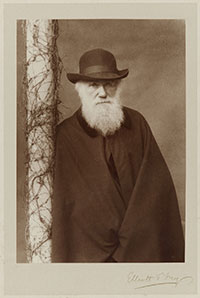To many of us, Darwin's name is synonymous with his theory of evolution by natural selection. But even before the publication of On the Origin of Species in 1859, he was publicly known through his popular book about the voyage of the Beagle, and he was esteemed by scientific colleagues for his work in geology and zoology. Rather than being the culmination of his career, Origin was the point of departure for Darwin's important works on variation, human heredity, and the evolution of emotions. His long intellectual life is worth studying both as a window into the wider world of the nineteenth century and for its lasting significance in science, culture, and the discussion of religion.
Born on 12 February 1809, Charles Darwin was the son of two noteworthy families. On his mother's side, the Wedgwoods were pioneers in the pottery industry, while his paternal grandfather was the renowned physician, poet, and natural philosopher Erasmus Darwin. Charles grew up in Shrewsbury along with three older sisters, Marianne, Caroline and Susan, an older brother, Erasmus Alvey Darwin, and a younger sister, Catherine. Their mother died in 1817, leaving them in the care of their father, Robert Waring Darwin, an outsize character who enjoyed great success in both his medical practice and in his business investments. Charles himself grew up to be a devoted family man. He married his cousin Emma Wedgwood in 1839 and they had ten children. Darwin spent most of his life working from home, where Emma and the children contributed to his efforts not only as companions but by assisting him in research, writing, and carrying on correspondence with colleagues (and even occasionally by serving as research subjects themselves). The depth of Darwin's affection for his children is revealed in his sense of loss when his daughter Annie died in 1851.
Darwin was educated at the universities of Edinburgh and Cambridge, where he devoted many hours to extracurricular studies of marine invertebrates, beetles, and geology. Through his connection with the Cambridge professor of botany, John Stevens Henslow, Darwin was offered the chance to travel around the world as a gentleman companion to Robert FitzRoy, the captain of H.M.S. Beagle. Referring to this five-year journey, which began when he was just 22, Darwin wrote, 'The voyage of the Beagle has been by far the most important event in my life and has determined my whole career.' While circumnavigating the globe, Darwin remained in constant contact with Henslow and with his family, sending letters that revealed in turn the exhilaration of discovering new landscapes and the stomach-flipping misery of life at sea. By the time he returned to England in 1836, Darwin had unearthed enormous mammalian fossils in South America, developed a new explanation for the formation of coral reefs, and witnessed the lifestyles of indigenous people from Tierra del Fuego to Tahiti. Along the way he made observations and collected specimens of animals, rocks, and plants that fuelled much of his later work.
Darwin's achievements during the voyage earned him membership in London's leading scientific circles and helped him to befriend one of his intellectual heroes, the geologist Charles Lyell. The six years Darwin lived in London were among the most productive of his career, as he published Voyage of the Beagle, coordinated the distribution and study of his Beagle specimens, and privately developed a theory of evolution. In 1842, Charles and Emma moved just south of London to the village of Downe, where they remained for the rest of Charles' life.
Plagued by illnesses for much of his life, the former voyager relied on written correspondence as his means of participating in public life and carrying on conversations with scientific friends such as Lyell and the botanist Joseph Hooker. These were the two men who urged him to publish his views on evolution in 1858, when Darwin learned by letter that Alfred Russel Wallace had developed a similar theory while collecting zoological specimens in the Malay Archipelago. At home in Downe, Darwin spent the last two decades of his life in much the same way as he had spent the previous twenty years, as an established country gentleman absorbed by the contents of his greenhouse and his garden, while the few hours a day he spent in his study produced a regular stream of letters, books, and articles. Beyond the village, his controversial work had given him one of the most renowned names in Victorian Britain.
Darwin died in April 1882; he was buried in Westminster Abbey.
ODNB article: https://doi.org/10.1093/ref:odnb/7176



